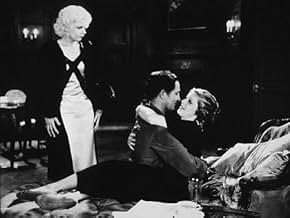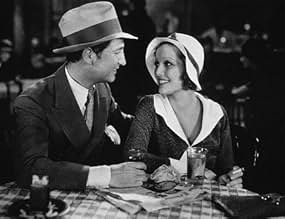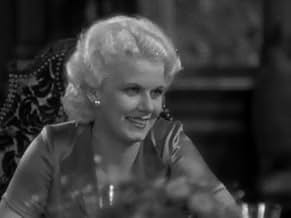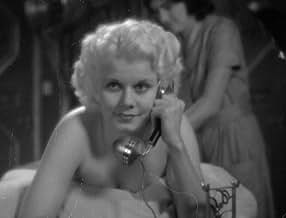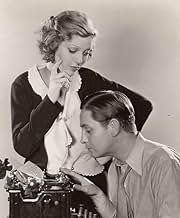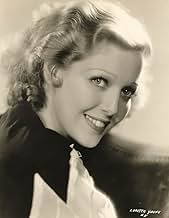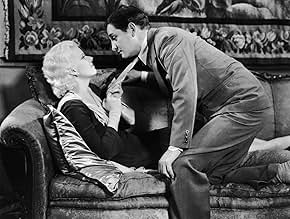VALUTAZIONE IMDb
6,7/10
3865
LA TUA VALUTAZIONE
Una giovane donna di una famiglia molto ricca sposa impulsivamente un giornalista, ma ognuno presume che lo stile di vita dell'altro sia quello che deve essere cambiato.Una giovane donna di una famiglia molto ricca sposa impulsivamente un giornalista, ma ognuno presume che lo stile di vita dell'altro sia quello che deve essere cambiato.Una giovane donna di una famiglia molto ricca sposa impulsivamente un giornalista, ma ognuno presume che lo stile di vita dell'altro sia quello che deve essere cambiato.
- Regia
- Sceneggiatura
- Star
- Premi
- 2 vittorie totali
Don Dillaway
- Michael Schuyler
- (as Donald Dillaway)
Claud Allister
- Dawson - The Valet
- (as Claude Allister)
Wilson Benge
- Butler
- (non citato nei titoli originali)
Vance Carroll
- Reporter
- (non citato nei titoli originali)
Eddy Chandler
- Hank - A Reporter
- (non citato nei titoli originali)
Richard Cramer
- Speakeasy Proprietor
- (non citato nei titoli originali)
Oliver Eckhardt
- Reporter
- (non citato nei titoli originali)
Bill Elliott
- Ann's Beau - The Round-the-World Flyer
- (non citato nei titoli originali)
Adolph Faylauer
- Party Guest
- (non citato nei titoli originali)
J.C. Fowler
- Reporter
- (non citato nei titoli originali)
Recensioni in evidenza
I see that I'm in good company here on IMDb in first wondering why on earth I had never heard of Robert Williams before and then in regretting that his career was cut so short after hearing his story.
Williams proves himself to be a winning and engaging comedian in this very funny Frank Capra film about a reporter (Williams) who marries a society dame (Jean Harlow) only to realize that his true love is for the female co-worker (Loretta Young) who's been by his side the whole time. Never mind that Young is one hundred times more feminine and prettier than Harlow -- I just chalk it up to the theory that Harlow had a certain look that was very much in vogue in the 1930s and that made her extremely attractive to people.
I don't think Harlow is at all attractive, but I do see her appeal, and I didn't find her performance to be as bad in this film as the history books have claimed. It's true that the casting should have been reversed, and Young should have played the society belle with Harlow as the working-class girl next door. But never mind. She equips herself pretty well with the material given her, and she manages to be believable in the role.
But in any case, it's neither of the women you'll remember from this movie. It's Williams and his absolutely fantastic way with a funny line. He died of appendicitis at the age of 37, and it's clear that 30s movie audiences lost a potentially major star when they lost him.
Grade: A-
Williams proves himself to be a winning and engaging comedian in this very funny Frank Capra film about a reporter (Williams) who marries a society dame (Jean Harlow) only to realize that his true love is for the female co-worker (Loretta Young) who's been by his side the whole time. Never mind that Young is one hundred times more feminine and prettier than Harlow -- I just chalk it up to the theory that Harlow had a certain look that was very much in vogue in the 1930s and that made her extremely attractive to people.
I don't think Harlow is at all attractive, but I do see her appeal, and I didn't find her performance to be as bad in this film as the history books have claimed. It's true that the casting should have been reversed, and Young should have played the society belle with Harlow as the working-class girl next door. But never mind. She equips herself pretty well with the material given her, and she manages to be believable in the role.
But in any case, it's neither of the women you'll remember from this movie. It's Williams and his absolutely fantastic way with a funny line. He died of appendicitis at the age of 37, and it's clear that 30s movie audiences lost a potentially major star when they lost him.
Grade: A-
Stew Smith is a salt of the earth, street smart, cynical wisecracking reporter who's proud of his $75 a week salary. While tracking a story about a rich kid involved in a breach of promise suit, he gets involved with the Schuylers. This group of nitwits is a super-rich family trying desperately to avoid bad publicity. Stew catches the eye of the gorgeous Ann Schuyler, and the two fall madly in love to the absolute horror of Anne's snooty mother (who unfortunately is afflicted with gastritis). Indeed, Stew and Ann actually get married--with predictably catastrophic results. How will the filmmakers deliver Stew out of Ann's arms and into the arms of Gallagher--the equally gorgeous reporter who's madly in love with Stew?
This wonderful Frank Capra comedy must have appealed greatly to the sentiments of the 1931 audience at the very depths of the Depression. The Schuylers (and their idiot lawyer Dexter Grayson) were everything that people loved to hate--snooty, superior, stupid, wholly undeserving of their vast riches. They are mocked ruthlessly, while Stew Smith and Gallagher, as worthy representatives of the working class, are portrayed with understanding and compassion. Stew briefly embraces the idle life of the super-rich (even to wearing garters), but, of course, this doesn't last long.
This is more than just a film for Frank Capra fans--it's a glorious spoof of the old-time newspaper business and a tasty bit of social history.
This wonderful Frank Capra comedy must have appealed greatly to the sentiments of the 1931 audience at the very depths of the Depression. The Schuylers (and their idiot lawyer Dexter Grayson) were everything that people loved to hate--snooty, superior, stupid, wholly undeserving of their vast riches. They are mocked ruthlessly, while Stew Smith and Gallagher, as worthy representatives of the working class, are portrayed with understanding and compassion. Stew briefly embraces the idle life of the super-rich (even to wearing garters), but, of course, this doesn't last long.
This is more than just a film for Frank Capra fans--it's a glorious spoof of the old-time newspaper business and a tasty bit of social history.
Robert Williams plays the kind of role Spencer Tracy did time and again at Fox and MGM--the brash, likeable working man--and, in fact, the picture suggests a dry run of Tracy's "Libeled Lady." There's a breach-of-promise suit, a roomful of reporters cracking wise, a rich-rich Long Island clan existing to be mocked, and the kind of farcical complications that made the newspaper comedy one of the '30s' most endearing genres. Unfortunately, the dialogue isn't as snappy as it thinks it is, and Jean Harlow is as miscast as a society dame as Loretta Young is as a world-weary reporter -- the whole thing might have made more sense if they switched roles. The compensations, though, are many: Capra giving his actors brilliant bits of business (the "puttering" scene is an unsung classic), a roster of swell character actors, and some pre-Production Code naughtiness, including two very sexy love scenes between Williams and Harlow. Capra's pace is slower than usual, and his later works had cleverer plot twists. His handling of actors, though, is as beautiful to behold as ever. And in Williams' irresistible performance, we have a glimpse of a star that might have been.
The most notable thing about this movie is Robert Williams unusual performance. I've seen performances like it but none of them were in 1931 and I was surprised I'd never heard of him. Turns out he *died* in 1931, and it's worth watching the movie just to see someone who could have been a star. The movie itself is quite enjoyable, although Harlow makes little impression as a society dame and it's difficult to believe the enticing Loretta Young could be any one's idea of "one of the boys."
After watching Platinum Blonde, I, like most other viewers, had to look up Robert Williams, wondering whatever happened to him while fearing the worst, the worst being true: he died shortly after he made this film. Tragic! One can wonder endlessly over what might have been. What is clear is that he was a natural for the camera, was highly skilled (years of stage experience behind him), and fit perfectly into the Capra-Riskind universe of tough-but- articulate Everyman up against monied mediocrities. He might well have ended up playing the Clark Gable role in It Happened One Night if he had been around at the time. In fact, the reporter he plays here seems like a first draft for that character. (The plot involves Williams as a reporter falling in love impulsively with the daughter of a wealthy Social Register family only to encounter the usual boobytraps built into such a union.)
The movie itself, though hard to separate from Williams's domination of it, stands up fairly well on its own. There are some imaginative camera movements and setups and intelligent, witty dialogue laced with fizzy Depression-era argot. The story is not very convincing but you suspend disbelief because of the way the actors, dialogue and cinematography bring it to life. The pace is leisurely, sometimes a bit too much so, with many minutes taken up in gentle, playful, ultra-naturalistic banter between Williams and his co-stars. I can't think of another film from that period that detoured so often into that type of throwaway conversational interlude.
Jean Harlow as the heiress and Loretta Young as a newspaper columnist are not ideally cast. Their roles should have been reversed, but it doesn't really matter because both actresses do well. Harlow, who by this time had had relatively little experience in front of a camera, seems right at home about 90% of the time. And it's hard to believe that Loretta Young was only 18 when she made this! But she had already been a veteran of several years standing as a film actress.
The movie itself, though hard to separate from Williams's domination of it, stands up fairly well on its own. There are some imaginative camera movements and setups and intelligent, witty dialogue laced with fizzy Depression-era argot. The story is not very convincing but you suspend disbelief because of the way the actors, dialogue and cinematography bring it to life. The pace is leisurely, sometimes a bit too much so, with many minutes taken up in gentle, playful, ultra-naturalistic banter between Williams and his co-stars. I can't think of another film from that period that detoured so often into that type of throwaway conversational interlude.
Jean Harlow as the heiress and Loretta Young as a newspaper columnist are not ideally cast. Their roles should have been reversed, but it doesn't really matter because both actresses do well. Harlow, who by this time had had relatively little experience in front of a camera, seems right at home about 90% of the time. And it's hard to believe that Loretta Young was only 18 when she made this! But she had already been a veteran of several years standing as a film actress.
Lo sapevi?
- QuizIn a 2008 interview, actor Christopher Plummer called Williams "...one of the most realistic comedians the screen had. He made Cary Grant look like he was overacting... To watch Robert Williams act was like seeing a comic using the Method, long before the Method became famous with Marlon [Brando] (Marlon Brando) and Monty [Clift] (Montgomery Clift)."
- BlooperWhen they are looking at the front page of "The Tribune Paper", in the headlines, the word "okay" is misspelled. It shows "It's okey with me."
The spelling of "OK" was not standardized for a long time. Writer Dashiell Hammett among others spelled it "okeh" and "oke",
- Citazioni
Dexter Grayson: Where were you yesterday?
Anne Schuyler: Oh, Stew and I went for a long ride. Dexter, is there any finishing school we could send him to?
Dexter Grayson: Yes - Sing Sing!
- ConnessioniEdited into 365 days, also known as a Year (2019)
I più visti
Accedi per valutare e creare un elenco di titoli salvati per ottenere consigli personalizzati
- How long is Platinum Blonde?Powered by Alexa
Dettagli
- Data di uscita
- Paese di origine
- Lingua
- Celebre anche come
- Platinum Blonde
- Luoghi delle riprese
- Azienda produttrice
- Vedi altri crediti dell’azienda su IMDbPro
Botteghino
- Budget
- 600.000 £ (previsto)
- Tempo di esecuzione
- 1h 29min(89 min)
- Colore
Contribuisci a questa pagina
Suggerisci una modifica o aggiungi i contenuti mancanti

